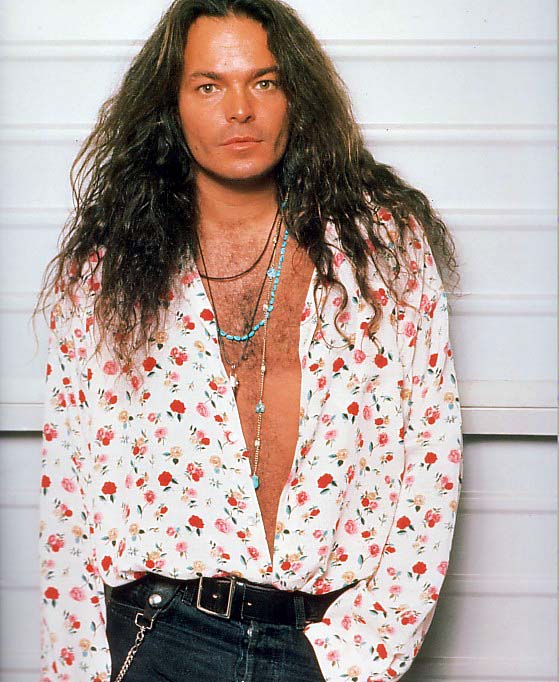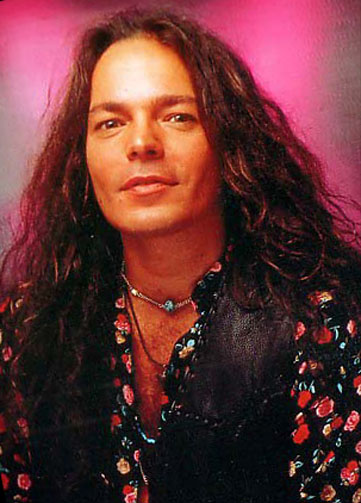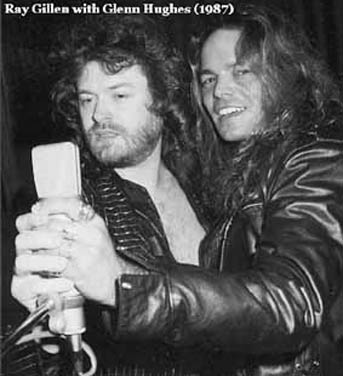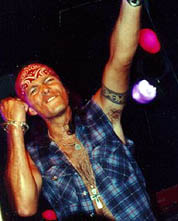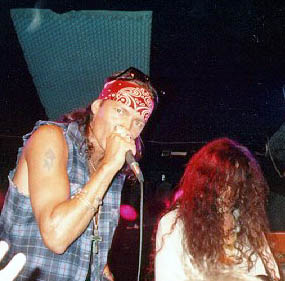|
|
|


Biography
Article by Marc Fevre, Napa, CA (1998)
Born May 12, 1961, in Cliffside Park, New Jersey,
singer Ray Gillen was without a doubt one of the best known
unknowns to come out of the rock and roll
world of the late 80's and 90's before his tragic and untimely death in
December of 1993 at the age of 32. In a career
that spanned nearly a decade, Ray found himself performing with
some of the greatest names of rock, appearing
with such bands and artists like Black Sabbath, Badlands, and
George Lynch on a variety of stellar album
releases and subsequent tours.
Though he was more of an athlete in school
than anything else, Ray's acute interest in music drove him to practice
singing on a daily basis in the privacy of
his own room at home after school. After a few years of singing
"alongside" such personal heroes as Bad Company
and Deep Purple, Ray gained enough confidence and strength
in his own voice to begin performing with
local bands and musicians. At the same time, however, Ray sought
additional confirmation that his talent was
indeed good enough to allow him to make a career of his passion, and it
was with this in mind that he sought out vocal
coach Robert Fitzgerald. Under Fitzgerald's tutelage, Ray's voice
grew tremendously in both power and range,
and Fitzgerald marked Ray as a potentially major talent from the
moment he first heard him sing.
The early 1980's found Ray performing in a
string of successful covers bands - most notably a band called Harlett,
who were well known for their renditions of
Van Halen material - before he joined the New York-based ensemble,
Rondinelli in 1985.
Founded by former Rainbow drummer, Bobby Rondinelli,
the band was something of a family affair, featuring as it
did Bobby's brother, Teddy, on guitars and
keyboards. Bassist, James Lomenzo rounded out the band's line up, and
with Ray on board the band quickly became
a popular draw on the East Coast club circuit, earning major label
interest along the way. As a result, a demo
album was recorded in late '85, and though Lomenzo left the band
shortly thereafter, they carried on in good
form with his replacement, Tommy Henriksen, until March of 1986,
when the band came to an abrupt end with Ray's
sudden departure for a once-in-a-lifetime shot at the big leagues
as former Trapeze/Deep Purple/Hughes-Thrall
vocalist Glenn Hughes' replacement with Heavy Metal legends,
Black Sabbath.
Having left both Rondinelli and an opportunity
to take the lead in the popular Broadway musical, Cats, behind, Ray
served as Hughes' replacement on Sabbath's
tour in support of the Seventh Star record, before then returning to
England with the band to begin work on their
next album, The Eternal Idol, in early 1987. Sadly, in the wake of a
series of defections by other members, Ray
ultimately opted to leave the band himself, joining bassist Tony
Franklin of The Firm and legendary drummer,
the late Cozy Powell in the initial incarnation of ex Thin
Lizzy/Whitesnake guitarist John Sykes' band,
Blue Murder. This also proved to be a short lived stint, however, as
both Ray and Cozy left the band in quick succession.
Thusly, it wouldn't be until the Winter of
1987 that Ray's vocals would make their vinyl debut, Ray having joined
a
cadre of all-star singers such as John Wetton
(King Crimson/Asia), Glenn Hughes, and Max Bacon (Bronz/GTR) to
work on the Phenomena II: Dream Runner record,
the second project album from noted British producer, Tom
Galley.
The advent of 1988 found Ray returning to America
to begin the process of putting together a new band of his own.
Ray was quick to contact former Rough Cutt/Ozzy
Osbourne guitarist Jake E. Lee, and together, along with Ray's
former Sabbath bandmate, drummer Eric Singer,
they began auditioning a series of bass players before finally
settling on ex Steeler bassist, Greg Chaisson.
With the line-up complete, and a deal in hand from Atlantic Records
subsidiary, Titanium Records, the band, Badlands,
went into the studio to record their self-titled debut, which was
released to rave reviews in early 1989.
With their first single, "Dreams in the Dark",
in heavy rotation on MTV, the band were out on the road in support
of the Badlands album for much of the next
year, pausing only briefly to recruit drummer Jeff Martin as Eric
Singer's replacement before going back into
the studio to begin work on their second album, Voodoo Highway in
1990. That album was released in 1991, and
the band soon found themselves out on the road again, playing to eager
fans in both the United States and Britain.
Sadly, owing to a variety of poor business decisions, internal pressures
came to a head in 1992, and with Ray's exit
a reality, the band threw in the towel after a short series of gigs with
Ray's replacement, singer John West.
A third album done with Ray prior to his departure, Tribal Moon, was left unreleased and in the vaults.
Ray would appear as a guest performer on a
couple of albums from other artists (Atsushi Yokezeki- Raid/George
Lynch- Sacred Groove) before forming his next
band, Tariff, with guitarist Joe Holmes. The L.A.-based band were
quick to break up, however, and upon his return
to New York in 1993, Ray promptly teamed up with former Alice In
Chain bassist, Mike Starr, guitarist Al Romano,
and former Rondinelli bandmate, drummer Bobby Rondinelli, to
form the band Sun Red Sun. In an ironic twist
of fate, however, only a handful of numbers were recorded with
producer Leif Mases, before Rondinelli left
to join... Black Sabbath! The next blow to the band came when Ray,
owing to general fatigue and increasingly
poor health was forced to suspend any further work on the project, killing
any real hopes that the band's debut album
would ever be finished.
Rumors that Ray had contracted the AIDS virus
had been floating about since 1990, but by the fall of 1993, there
was little doubt that Ray was indeed afflicted
with the dreaded disease, and on December 3, 1993, Ray ultimately
succumbed to AIDS-related complications, dying
at his home in New Jersey.
A memorial concert in tribute to Ray was organized
by vocalist Glenn Hughes in February of 1994, and a number of
rock luminaries including singer Sebastian
Bach of Skid Row, former Mariah Carey guitarist, Paul Pescoe, and
Glenn's own band, the recently reformed Trapeze,
showed up to perform and pay homage to Ray's memory.
Atlantic Records expressed an interest in
releasing a recording of the concert, but at the request of Ray's family,
no such album was ever completed.
Though 1996 would see the release of War Dance,
the until then unreleased demo album that Ray had recorded
with Rondinelli back in '85, it was in 1995
that guitarist Al Romano succeeded in his efforts to release the debut
album from Sun Red Sun. Other singers had
been brought in to finish the record, (indeed, Romano himself sang on
a couple of songs), but in honor of Ray's
memory, his vocals were left intact on four songs, making the release a
testimony to Ray's final efforts before his
passing.
Today, though Ray's legacy remains a small
one in terms of over all recorded output, there can be no question that
the quality of his performance on these few
gems alone will be sufficient to keep the power of his memory alive for
decades to come.
We will not forget.
- Marc Fevre, Napa, CA (1998)
